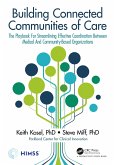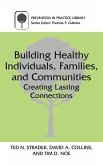Dedicated and hard-working staff at all levels of large healthcare organisations can be frustrated by a perceived inability to influence healthcare priorities. One way of enabling such practitioners to shape and improve services is to bring them together in 'communities of influence'. These are informal groups or networks of committed people who meet regularly to share experiences, develop a collective voice and influence policy and practice at local and national levels. Such 'bottom-up' approaches to change can complement the more conventional management mechanisms widely employed today. Communities of Influence tells the story of how a prominent UK non-profit organisation (Macmillan Cancer Support) has engaged both professionals and patients over the past two decades to improve cancer care. It will stimulate managers and practitioners alike to develop their capacity to work through networks, relationships and conversations in pursuing their objectives. This book will appeal to clinicians and managers responsible for service improvement, as well as public servants, researchers and educators interested in management and organisational change. At a time when the 'big society' is the policy idea of the day, this book illustrates what can be achieved when communities of practice become communities of influence. In so doing, the authors offer a timely counterpoint to believers in command and control and rampant competition by stressing the critical role of networks and relationships. The ideas they discuss are at once simple and complex and have the potential to be revolutionary when taken forward in the right hands. Professor Chris Ham, Chief Executive of The King's Fund This wonderful book describes how a creative, problem-solving organisation can be encouraged to start, grow and flourish. The result is a text that could act as a guide for 21st century healthcare, one of the key books for an era in which it will be recognised that new solutions are needed for the problems we face. From the foreword by Sir Muir Gray This book is a welcome antidote to the usual approaches to improving healthcare which take the form of endlessly changing organisational structures and relentless monitoring, often with dubious consequences. It presents an alternative, holding out the prospect of gradually accumulating changes in the actual work of those delivering healthcare in a complex environment. Professor Ralph Stacey, Complexity Research Group, University of Hertfordshire
Hinweis: Dieser Artikel kann nur an eine deutsche Lieferadresse ausgeliefert werden.
Hinweis: Dieser Artikel kann nur an eine deutsche Lieferadresse ausgeliefert werden.








